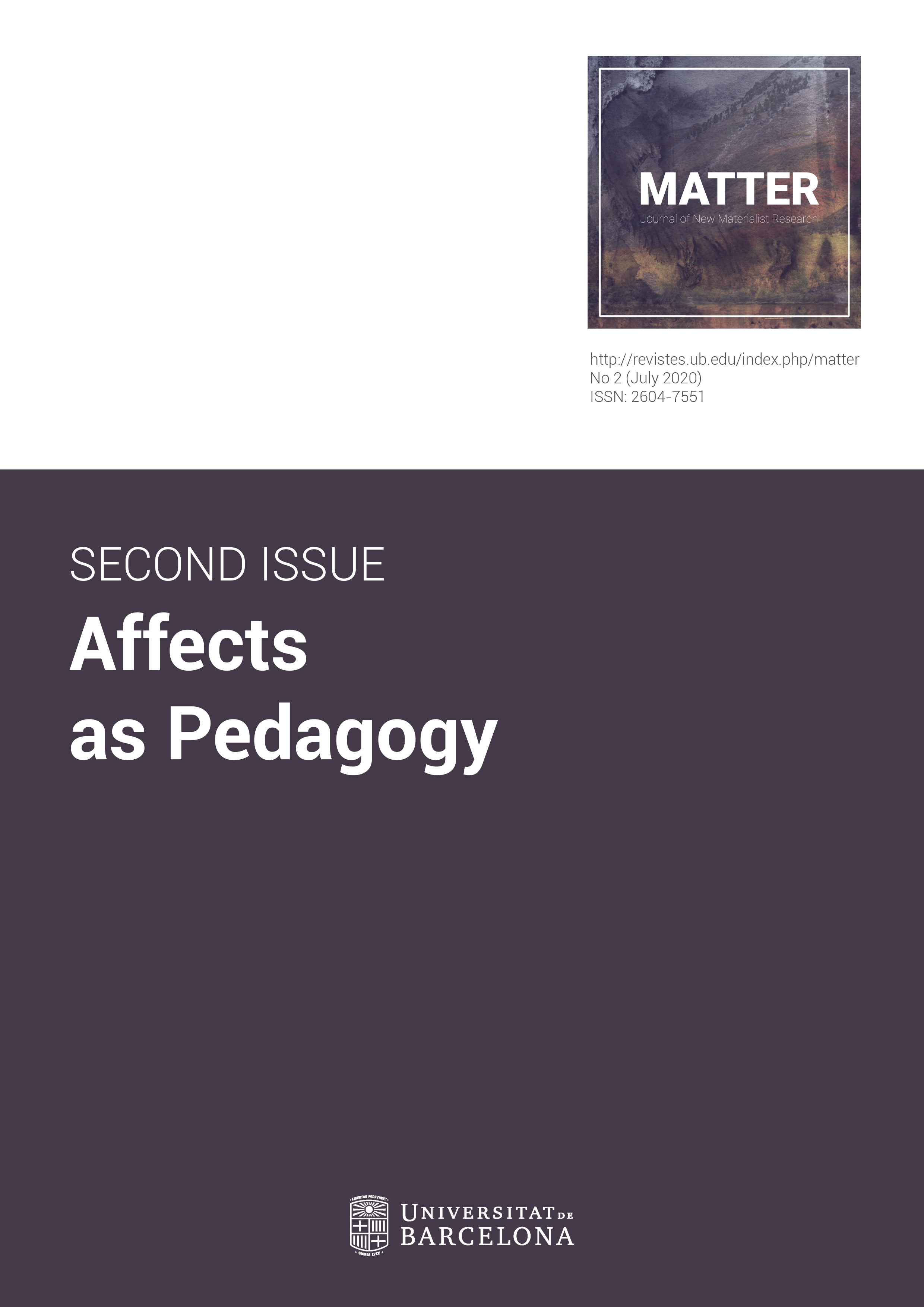Posthumanism, education and decolonization: A conversation with Michalinos Zembylas
DOI:
https://doi.org/10.1344/jnmr.v1i2.31972Resum
The work of creating decolonized futures has been a particularly important undertaking in educational contexts, for which posthumanist and new materialist theories provide useful insights. Yet, how decolonization is to be achieved and whose responsibility it is remains up for discussion. This intra-view focuses on the tensions between decolonizing practices and posthumanism, and their implications foreducation: What can(’t) these theories do to decolonize education? And how do weengage in posthuman practices in education without overstepping, appropriating, or (re)colonizing Indigenous epistemologies? Thinking through these questions, in this intra-view we engage in a conversation with Michalinos Zembylas.
Descàrregues
Referències
Andreotti, Vanessa, Sharon Stein, Cash Ahenakew & Dallas Hunt (2015). Mapping interpretations of decolonization in the context of higher education. Decolonization: Indigeneity, Education & Society, 4(1), 21–40. Retrieved April 22, 2020, fromhttp://representing-education.gertrudecotter.info/wp- content/uploads/2016/08/andreotti-stein-ahenakew-hunt-decolonization.pdf
Anzaldúa, Gloria & Analouise Keating (2002). This bridge we call home: Radical visions for transformation. New York: Routledge.
Arendt, Hanna (1972). Crises of the republic: Lying in politics, civil disobedience on violence, thoughts on politics, and revolution (Vol. 219). Houghton Mifflin Harcourt.
Barad, Karen (2007). Meeting the universe halfway: Quantum physics and the entanglement of matter and meaning. Durham: Duke University Press.
Barreiro, Jacky, & Melisse Vroegindeweij (2020). New materialist becomings and futurities: A panel intra-view. Matter: Journal of New Materialist Research, 1(1), 138- 154. doi: https://doi.org/10.1344/jnmr.v1i1.30132
Bekerman, Zvi, & Michalinos Zembylas (2018). Psychologized language in education: Denaturalizing a regime of truth. New York: Palgrave Macmillan-Springer.
DiAngelo, Robin (2011). White Fragility. International Journal of Critical Pedagogy, 3(3), 54–70. Retrieved April 22, 2020, from http://libjournal.uncg.edu/ijcp/article/view/249
DiAngelo, Robin (2018). White fragility: Why it's so hard for white people to talk about racism. Beacon Press.
Essed, Philomena, & Sandra Trienekens (2008). ‘Who wants to feel white?’ Race, Dutchculture and contested identities. Ethnic and Racial Studies, 31(1), 52-72. doi: 10.1080/01419870701538885
Hemmings, Clare (2012). Affective solidarity: Feminist reflexivity and political transformation. Feminist Theory, 13(2), 147–161. doi: 10.1177/1464700112442643
Horton, John, & Peter Kraftl (2009). Small acts, kind words and “not too much fuss”:Implicit activisms. Emotion, Space and Society, 2(1), 14–23. doi: 10.1016/j.emospa.2009.05.003
Keene, Adrienne & Matika Wilbur (2019, March 12). Can a DNA test make me Native American? All My Relations Podcast. Accessed April 22, 2020, on https://www.allmyrelationspodcast.com/podcast/episode/33235119/ep-4-can-a- dna-test-make-me-native-american
Leonardo, Zeus & Michalinos Zembylas (2013). Whiteness as technology of affect: Implications for educational praxis. Equity & Excellence in Education, 46(1), 150-165. doi: 10.1080/10665684.2013.750539
Matias, Cheryl & Michalinos Zembylas (2014). 'When saying you care is not really caring': Emotions of disgust, whiteness ideology, and teacher education. Critical Studies in Education, 55(3), 319-337. doi: 10.1080/17508487.2014.922489
Mawhinney, Janet (1998). 'Giving up the ghost': Disrupting the (re)production of white privilege in anti-racist pedagogy and organizational change. Master’s thesis, OntarioInstitute for Studies in Education of the University of Toronto. Available at:http://www.collectionscanada.gc.ca/obj/s4/f2/dsk2/tape15/PQDD_0008/MQ33991. pdf
Spinoza, Baruch (1949). Ethics. New York, NY: Hafner Publishing
TallBear, Kim (2014). Standing with and speaking as faith: A feminist-indigenous approach to inquiry. Journal of Research Practice, 10(2), Article N17. Retrieved April 22, 2020, from http://jrp.icaap.org/index.php/jrp/article/view/405/371
Tuck, Eve & Wayne Yang (2012). Decolonization is not a metaphor. Decolonization: Indigeneity, Education & Society, 1(1), 1-40. Retrieved April 22, 2020, fromhttps://jps.library.utoronto.ca/index.php/des/article/view/18630
Wynter, Sylvia (2003). Unsettling the coloniality of being/power/truth/freedom: Towards the human, after man, its overrepresentation—an argument. CR: The New Centennial Review, 3(3), 257-337. https://doi.org/10.1353/ncr.2004.0015
Wynter, Sylvia, & Katherine McKittrick (2015). Unparalleled catastrophe for our species? Or, to give humanness a different future: Conversation. In K. McKittrick (Ed.),Sylvia Wynter: On being human as praxis (pp. 9-89). Durham, NC: Duke University Press. https://doi.org/10.1215/9780822375852-002
Zembylas, Michalinos (2018a). Affect, race and white discomfort in schooling:Decolonial strategies for ‘pedagogies of discomfort’. Ethics and Education, 13(1), 86- 104. doi: 10.1080/17449642.2018.1428714
Zembylas, Michalinos (2018b). The entanglement of decolonial and posthuman perspectives: Tensions and implications for curriculum and pedagogy in higher education. Parallax, 24(3), 254-267. doi: 10.1080/13534645.2018.1496577
Descàrregues
Publicades
Número
Secció
Llicència
The authors who publish in this journal agree to the following terms:- Authors retain copyright and grant the journal the right of first publication.
- Texts will be published under a Creative Commons Attribution License that allows others to share the work, provided they include an acknowledgement of the work’s authorship, its initial publication in this journal and the terms of the license.






